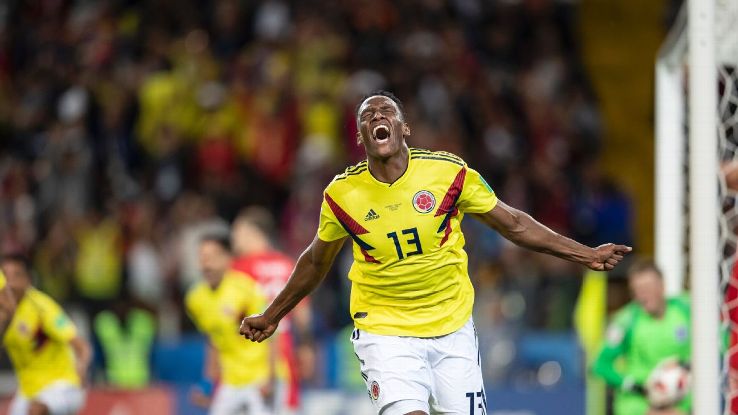


Relive England’s triumphant penalty shootout win over Colombia in LEGO style, as they now build momentum heading into the quarterfinals.
With three goals in three games, each one celebrated with an outlandish dance, Colombia’s Yerry Mina has been one of the stars of the World Cup, and the adoration he’s received back home has been badly needed after a nightmarish six months at Barcelona.
Mina’s fall from grace in Spain and his resurgence in Russia was clearly on the defender’s mind when he spoke to reporters following Colombia’s penalty shoot-out defeat to England, as his stoppage-time header had temporarily kept his side in the tournament by forcing a 1-1 draw and extra-time.
“I don’t need to prove anything to anyone,” he said.
The truth is though, Mina had a lot to prove. To put it bluntly, Mina was a laughing stock in Spain before the World Cup. Since joining from Brazilian side Palmeiras for €12 million, he was hardly even called into Ernesto Valverde’s matchday squads and on the odd occasion he did play, Barca’s usually serene defence often turned into a scene of anarchy.
Mina made four league starts for Barca last season after joining from Palmeiras in January and the statistics do not make for pleasant reading. The Catalans only won of those games, drawing two and losing once, conceding seven goals while scoring six.
Put another way, Barca conceded 29 goals in 38 league games on their rampant run to winning the Liga title. When Mina started, they conceded seven goals. That’s just under a quarter of all their goals coming when the Colombian played despite him starting barely more than one-tenth of their games. His only victory as a starter was a 1-0 win over Real Sociedad on the final day of the season.
Mina’s debut came in a surprise 0-0 draw at home to Getafe, where he actually impressed despite the drab result. His unsuitability to Barca first became clear during the 2-2 draw at Celta Vigo in April: he was repeatedly caught out of position and was easily beaten by Jonny Castro and Iago Aspas for both of the Galician side’s goals. Such fears were brutally confirmed in the chaotic 5-4 defeat to strugglers Levante, as he helplessly strutted about while lowly Levante repeatedly tormented Barca on the counter-attack.
The media showed no mercy with Mina the next day. The front cover of Diario Sport pictured the blank face of the Colombian below the headline “Without a defence,” clearly pointing the finger at him for Barca’s only defeat of the season. Reports then emerged in May that Barca were already looking to offload Mina, and their much-publicised pursuit of French defender Clement Lenglet is hardly a vote of confidence for him.
With Samuel Umtiti recently signing a new contract and Gerard Pique remaining as important as ever, even in the unlikely event Mina does stay, he will likely be the fourth-choice centre-back or even fifth-choice if Thomas Vermaelen stays.
 Mina’s struggle to fit in at Barcelona might lead him to a new club but a great World Cup will help his prospects.
Mina’s struggle to fit in at Barcelona might lead him to a new club but a great World Cup will help his prospects.
Colombia coach Jose Pekerman said that Mina’s lack of continuity was the reason why he had played so badly in his rare appearances for Barca. “He went from playing consistently to playing almost never,” he said.
“He’s also in a team where the same players always play and when a new arrival turns up the team can become disjointed. It’s true Mina didn’t play well but perhaps they were too harsh on him. And that was very tough for Yerry.”
An alternative view is that Mina’s contrasting fortunes for club and country simply highlights the singularity of the demands placed on defenders at Nou Camp, which are like nowhere else in world football. Dmytro Chygrynskiy, Alex Song, Marc Bartra, Martin Caceres, Henrique, Vermaelen and Jeremy Mathieu form a long list of players who signed for Barca over the past decade and were tasked with playing at centre-back but were not simply not good enough. Mina, despite proving himself at international level, looks set to join it.
France defender Umtiti, along with converted midfielder Javier Mascherano, are the only players from outside that have been able to adapt to life in Barca’s backline. It is telling that the two best defenders to play for the club in the past decade are Pique and Carles Puyol; both grew up learning how to play the Barca way.
Pique once perfectly summed up the challenges Barca defenders face.
“You have to think about constructing play and when you are defending you have to do so 40 metres away from goal,” he said. “I grew up like this, playing this way, but I understand that for those who arriving, it’s not easy.”
One of Pique’s main strengths is his ability to cut out balls in behind the defensive line. He has never been an archetypal “in the trenches” type of defender. Mina isn’t either but the defender’s physical attributes, which would be so highly valued at other clubs (especially in England), are not as useful at Barca, where the bulk of defensive play takes place well away from the box. Another of his strengths, his aerial threat from set pieces, is something Barca tend to view as a last resort rather than a regular game plan.
The good news for Mina is that after his World Cup heroics, he is certain to have a bright future away from Camp Nou. The good news for Barca is his price has just rocketed.
Richard Martin covers FC Barcelona for ESPN FC. Twitter: @rich9908.

Be the first to comment